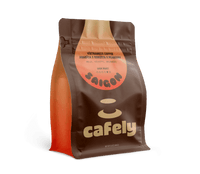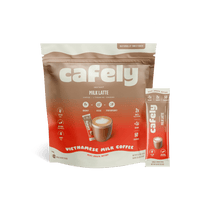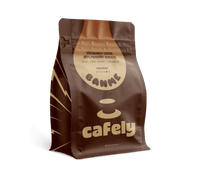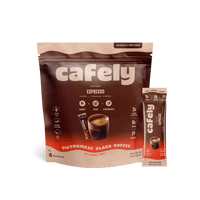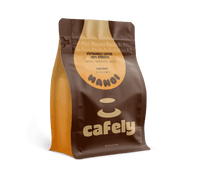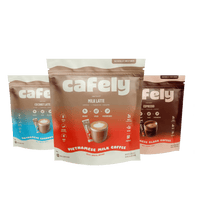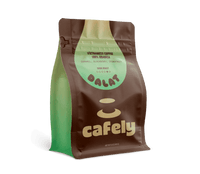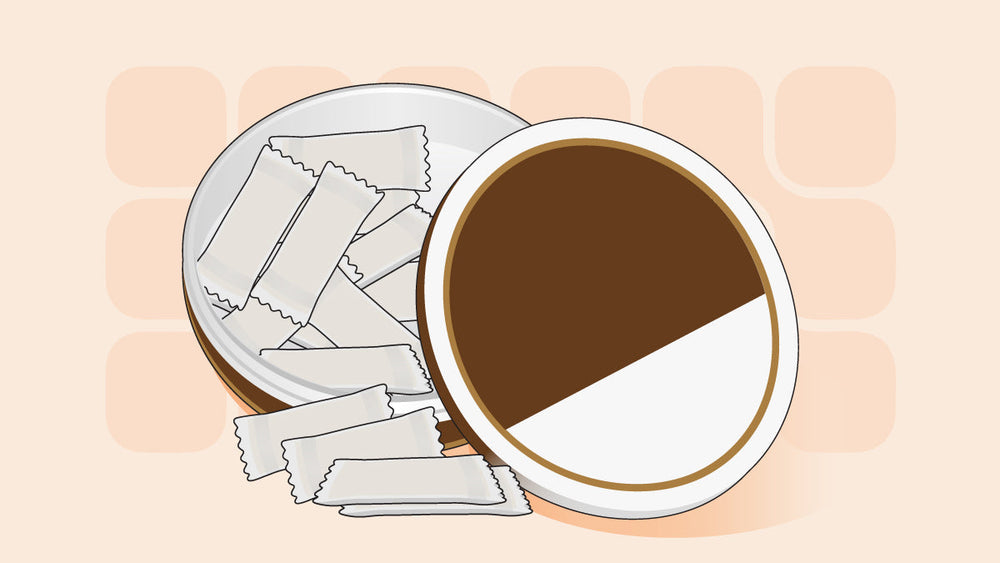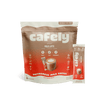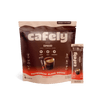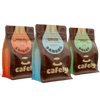Coffee” ZYNs don’t deliver caffeine — they’re nicotine pouches with a coffee flavor.
That can be confusing since both nicotine and caffeine pouches look alike, are used the same way, and even share flavors.
But their ingredients and effects are very different. Here’s how to tell them apart.
Do Coffee ZYNs Have Caffeine? The Definitive Answer
Despite the name, coffee-flavored ZYN pouches won’t give you a caffeine boost.
They’re part of ZYN’s nicotine pouch lineup, meaning the active ingredient is nicotine.
The “coffee” in this product refers strictly to the flavoring, which is artificially created to mimic the taste of a cup of coffee.
Other ingredients include plant-based fibers, flavoring agents, sweeteners, and pH adjusters to help you absorb the ingredients better.
Understanding Nicotine Pouches vs. Coffee Pouches

Even though they may look nearly identical, what’s inside nicotine pouches and coffee pouches sets them apart entirely.
Nicotine pouches, like ZYNs, are made to deliver nicotine without tobacco leaf. They’re smokeless, spit-free, and often used by people looking for a discreet alternative to cigarettes or vaping. They don’t contain caffeine.
Coffee pouches, on the other hand, are designed for an entirely different purpose: providing caffeine without brewing or sipping. These use ground coffee or caffeine-infused ingredients to give you a mild energy boost, but contain no nicotine at all.
The overlap in design and flavor options like mint, citrus, coffee, and mocha is what causes much of the confusion. Both products are portable, mess-free, and used the same way, so it’s easy for someone to grab a tin thinking they’re getting one type of stimulant and end up with the other.
Caffeine Content in Coffee Pouches
Unlike coffee-flavored nicotine pouches, real coffee pouches actually deliver caffeine, and the amount can vary quite a bit. A brand like Grinds usually has around 20 to 25 mg of caffeine per pouch, though some extra-strong varieties from other companies can climb closer to 80 mg.
To put that in perspective, a standard 8-oz cup of brewed coffee averages around 95 mg of caffeine. So a single pouch often delivers less than a full cup, but you can adjust your intake by using multiple pouches over time for a sustained lift rather than one big jolt.
Different brands and flavors influence the caffeine level, with some aiming for a gentle pick-me-up and others targeting people who want a stronger, coffee-like buzz without drinking anything.
Health Considerations for Nicotine & Caffeine Pouches
While nicotine and caffeine are both stimulants, they affect the body and carry risks in very different ways.
Nicotine is highly addictive, even in tobacco-free pouches. Regular use can lead to dependence, withdrawal symptoms, elevated heart rate or blood pressure, weakened immune response, and cancer [1]. In fact, the World Health Organization estimates that tobacco kills more than 8 million people a year.
Caffeine is far less addictive and comes with fewer risks. However, regular users can still experience mild dependence and withdrawal symptoms like headaches or fatigue [2].
Other potential side effects of caffeine include:
- Anxiety
- Insomnia
- Headaches
- Hypertension
- Gastrointestinal upset
- Tremors
- Palpitations
- Sleep disturbances
- Dehydration
Most people won’t feel these effects if they stay below the recommended maximum of 400 mg of caffeine per day.
FAQs: Do Coffee ZYNs Have Caffeine?
We’ve compiled clear answers to the most common questions about ZYN and coffee pouches below.
1. Do Coffee ZYNs Contain the Same Caffeine Type as Coffee Beans?
No. Coffee ZYNs have no caffeine at all — nicotine is the main active ingredient. The flavor is artificial and purely for taste.
2. Do Coffee Pouches Give You Energy?
Yes, if they are genuine coffee pouches containing caffeine. Nicotine pouches can also feel stimulating, but through a different mechanism involving nicotine’s effects on the nervous system.
3. How Long Do You Keep a ZYN Pouch in Your Mouth?
Zyn’s usage guidelines suggest keeping the pouch in your mouth between 15 and 30 minutes.
4. How Many Coffee Pouches a Day Can I Take?

Follow total caffeine intake guidelines, which most health authorities suggest is up to 400 mg per day for healthy adults. But you may want to adjust for your personal tolerance and account for other caffeine sources to avoid getting overstimulated or having trouble sleeping.
5. Are Nicotine Pouches Safer Than Chewing, Smoking, or Vaping?
Yes, they technically avoid tobacco combustion and inhalation (lighting up the tobacco), which reduces some of the risks. Despite that, nicotine is still addictive and can raise heart rate and blood pressure. Beyond this, the long-term effects of nicotine pouches aren’t fully known.
6. Can You Drink Coffee With ZYN?
Yes, but you’ll be combining two stimulants. This can heighten side effects like heart palpitations, anxiety, or dizziness. Monitor your response and use caution if you’re sensitive to stimulants.
7. What Are the Side Effects of Coffee Pouches?
Possible effects include jitteriness, sleep disruption, rapid heartbeat, digestive upset, and anxiety. If you use it often, you may also experience stains on your teeth and mouth or irritation.
8. Is 80 mg of Caffeine a Lot?
Not particularly, as it’s roughly equal to a small cup of drip coffee. For most adults, this amount of caffeine is within a safe range, but sensitivity to stimulants varies, and your total daily intake should stay under 400 mg.
9. Do Coffee Pouches Stain Your Teeth?
They can, since coffee compounds can discolor enamel, the outside layer that protects your teeth. To avoid this, rinse your mouth with water when you’re done using them and maintain good oral hygiene.
10. Does Nicotine Have Caffeine?
No, nicotine and caffeine are entirely different substances. Caffeine comes from coffee, tea, and similar plants, while nicotine is a stimulant found in tobacco and used in nicotine products.
References
- Mishra A, Chaturvedi P, Datta S, Sinukumar S, Joshi P, Garg A. Harmful effects of nicotine. Indian J Med Paediatr Oncol. 2015 Jan-Mar;36(1):24-31. doi: 10.4103/0971-5851.151771. PMID: 25810571; PMCID: PMC4363846.
- Evans J, Richards JR, Battisti AS. Caffeine. [Updated 2024 May 29]. In: StatPearls [Internet]. Treasure Island (FL): StatPearls Publishing; 2025 Jan-.
